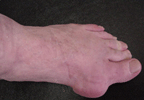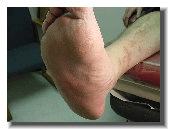Hubby and I are in the middle of a very interesting "self-study". We took a recent trip and were at sea level and he felt wonderful. His feet were well. Came back to the mountains....he had the worst flare up ever and was on crutches.
For the past 10 days, he has been back at sea level and says that he feels fantastic. He's been out walking all over the place. He even walks 1/2 mile each way to and from the office site.
We plan to watch what happens when he returns home. And then we have discussed taking a trip to sea level next month just to see if there is a pattern here.
When I tried to do some research online, I don't find much other than 14,000 feet....far higher than where we are! I have a firiend who had a baby born here with heart problems. They made her move to sea level for the child's heart. I've read articles about diabetics coming to a high altitude to ski and having problems, but not anything about a diabetic living at a high altitude feeling better or improving when they move to sea level.
But I think our experiment is worth a try. And if he continues to feel better at sea level...that might well determine where we retire.
Wednesday, August 08, 2007
Subscribe to:
Post Comments (Atom)



3 comments:
I too would like more info on this subject! When we went to the mountains approx 1000 ft above sea level.. my husband also had more complications... such as catching his breath,his eyes hurt, headaches.etc... I havent thought of it before your blog, but when we were at the beach he had 3-4 good days and the bad day was mild compared to most .... I would like to find more info if possible too. wonder how we could? Interesting.
Your blog is great! Keep your chin up!
I have googled and yahoo'd this til I'm blue. All I can find are tests done at 14,000 ft or higher. Nothing for normal altitudes.
My guess? No one wants us to know! Can you imagine the headines "DON"T MOVE TO VAIL IF YOU HAVE DIABETES!"? LOL! There would be so many lawsuits because of course, everyone wants you to go ski and spend you money at the resorts!
or the other headline: MOVE TO THE OCEAN IF YOU HAVE DIABETED!!! I just don't think there will ever be a physician who will say one way or the other.
BUT....we leave Friday to drive to the ocean. His feet are totally infected at the moment. I will be posting the result of this trip. We plan to be at sea level for 7 days. If they heal, this will be the 3rd time and that's all I need to tell me that somehow it's altitude related!
DW
I am an extreme skier/rock climber living in Colorado and a type 1 diabetic. Altitude does have an effect on insulin. This is related to the atmospheric pressure at altitude. The less pressure the less the insulin is able to enter the cells. What this means is as a diabetic doing activity in altitude must take extra precautions and monitor the insulin carefully. More insulin is required the higher one goes and then the insulin taken is less effective. This has been my experience with altitude, as I descend in altitude my insulin "kicks" in hard. Even moderate changes in altitude will have an effect on insulin and how it works...this is not taught in most diabetic circles. Check with diabetic divers and you will see that they need to be careful diving because they will go low quickly because of the increase in pressure.
Post a Comment